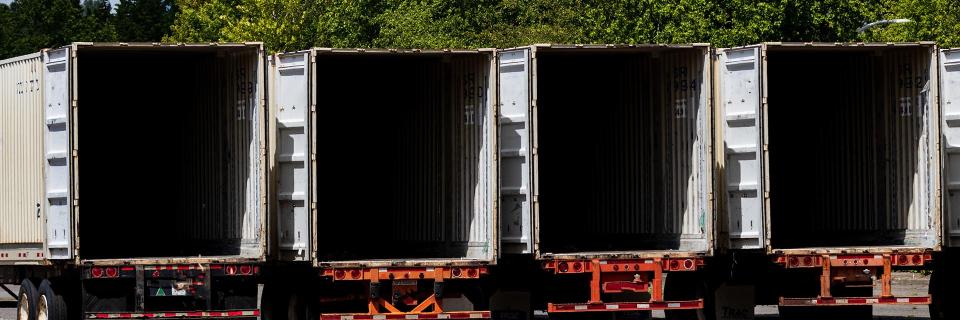
One company estimates that anywhere between $500 and $700 million per year goes into the hands of double brokers or other fraudsters. Likewise, freight insurer TT Club reports that 15 percent of the claims they pay out are due to freight fraud.
The first step in preventing these scams and others is awareness. Learn the most common types of freight fraud, so you can take measures to prevent it from damaging your business.
Scams trucking companies should watch for
Scams directed at trucking companies can take several forms. Here, we’ll outline some of the most common freight fraud schemes to look out for:
- The “too good to be true” offer. If you’re approached with an offer that’s significantly above market prices, you may be looking at a freight scam. Fraudulent brokers will often promise an amazing payout, but they don’t have any intention of following through with payment. Investigate any broker that submits an abnormally high offer before moving forward.
- Broker impersonation. It’s not uncommon for fraudsters to impersonate legitimate brokers to defraud trucking companies. They may forge credentials, logos or email addresses so they appear authentic, offer a freight load for transport (often with a “too good to be true” figure), then request an upfront escrow payment to cover costs. At that point, the fraudster may disappear completely with your payment, or arrange for the load to be stolen in transit so you incur even more loss.
- Identify theft. Fraudsters are becoming increasingly sophisticated in their methods, to the point of even stealing legitimate carriers’ MC numbers to get loads booked. This is sometimes referred to as “MC number hijacking". Scammers will use the MC numbers to pose as a carrier, book a load and then disappear with the cargo.
- Fuel advance fraud. This type of freight fraud occurs when a scammer poses as a carrier and offers to transport a load for your trucking company. They then request a fuel advance to cover the cost of fuel. Once the fuel payment is made, the scammer takes off with the cash but never follows through with transporting the load.
- Double brokering. This scheme can get a little complex, which is one reason trucking companies often fall victim to it. Essentially, double brokering occurs when a freight broker passes off a load to a fraud posing as a legitimate carrier. The fraud, however, is simply another broker who passes off the load to an actual carrier. The fraudulent broker then pockets the payment from the original broker and never pays the carrier for their services.
Protect yourself from freight broker fraud
With so many types of freight brokering scams in play, and as fraudsters grow more sophisticated, how do you keep your trucking company from becoming a target? By taking these preventative measures and adhering to best practices, you can effectively protect your company’s assets and reputation.
- Do your due diligence. When you’re working with a new broker, don’t assume they’re legitimate just because their communication appears as such. Run their MC or USDOT number through a regulatory database, like the Federal Motor Carrier Safety Administration’s (FMCSA) Safety and Fitness Electronic Records (SAFER) system. The SAFER system compiles broker credentials and information so you can cross-check for accuracy.
- Review load information. One major red flag to watch for is inaccurate load information. Are the pickup and delivery details vague or incomplete? Is there missing contact information? Are the load descriptions inconsistent? Ask yourself these questions as you review the load information. If you get a “yes” to any of them, you may be dealing with a scammer.
- Look for tip-offs in rate sheets. Just like inaccurate load information can be a sign of a scammer, you may see similar inconsistencies in rate sheets. Missing information, suspicious formatting or vague verbiage are all indicators that you’re potentially dealing with a fraud, and not an actual broker.
- Don’t let yourself be pressured. Often, fraudsters try to rope you in by pressuring you to accept loads immediately. Scammers commonly create a sense of urgency to get companies to take the plunge without taking proper precautions or vetting information. If a broker ever asks you to work on a tight timeline that prevents you from performing your due diligence, be on your guard.
- Get everything in writing. Written confirmations and agreements are critical for protecting your company against fraud. They provide a clear record of terms and expectations and give you some legal recourse if you are the victim of a freight scam. Get everything disclosed in writing before accepting a load—and don’t work with brokers who seem hesitant to sign agreements.
With these precautionary measures, you can minimize the likelihood of falling prey to freight fraud scams. Taking extra steps to research and verify information can save you from huge financial and time losses, while ensuring your business keeps a clean reputation.
Get more insights from RTS!
RTS has been helping trucking companies protect their drivers, their cargo and their bottom line for nearly 30 years. Discover more industry insights by visiting our website, or contact us today and learn about how our team can increase your company’s efficiency and profitability.